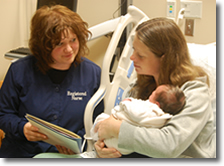Newborn Screening
- Newborn Screening Home
- Program Information
- Information for Families
- Information for Providers
- Materials and Resources
- Newborn Screening Data
- Contact Information
Related Topics
Contact Info
Newborn Screening Information for Providers:
Postnatal Education

On this page:
Introduction
Provider Responsibilities
Discussion Points
Introduction
The newborn screening system relies on members of the health care team to educate parents about newborn screening and its benefits. Parent awareness about the newborn screening process plays an important role in alleviating anxiety about positive, borderline, or unsatisfactory newborn screening results. We have developed a variety of education materials to help guide discussions with parents.
Minnesota Statutes 144.125-144.128 and 144.966 require birth hospitals and health care providers to inform parents about the benefits and risks of newborn screening, as well as the specific benefits and risks associated with choosing to opt-out of any part of newborn screening. The law also requires providers to document in the infant's medical record that the parents received information about newborn screening and had an opportunity to ask questions.
Provider Responsibilities
We recommend the following to meet the legal requirements:
- Provide and review the Newborn Screening Fact Sheet and Newborn Screening Infographic (highly recommended but not legally required) with parents. Both of these parent handouts are automatically sent to birth facilities and midwife practices with every newborn screening card. To view these handouts, visit our Education Materials and Forms (orderable) page.
- Inform parents that they have options after screening regarding the safe storage of their baby's blood spots and test results. These options are explained on the Newborn Screening Infographic. Visit our Retention Practices page for more information.
- Allow parents the opportunity to ask questions. Have forms available for parents who choose to refuse screening, give permission for research, or request destruction of blood spots and test results. All forms are available on our Education Materials and Forms (printable) page.
- Document in the newborn's medical record that the parents were given this information and that they had the opportunity to ask questions.
Discussion Points
If a parent is considering refusing newborn screening, it is important to review the following points:
- Newborns with the health problems we screen for often appear healthy at birth and have no family history of the disorder.
- Newborns with these health problems can die, become developmentally delayed, or damage can be irreversible if not identified early by newborn screening.
- Hearing loss is often not identified until 1 or 2 years of age without newborn screening. About 9 out of every 10 babies with hearing loss have hearing parents.
- If a parent chooses to refuse screening, the parent must sign a refusal form. The parent's decision will be documented in the baby's medical record and sent to the Minnesota Department of Health Newborn Screening Program.
- If a parent chooses to arrange for screening by a private laboratory, it is important to know that results may be delayed and follow-up will not be tailored to Minnesota's medical system. The health problems screened for by private laboratories may vary from those screened for by the Minnesota Department of Health Newborn Screening Program. Screening by a private laboratory should be arranged in advance.